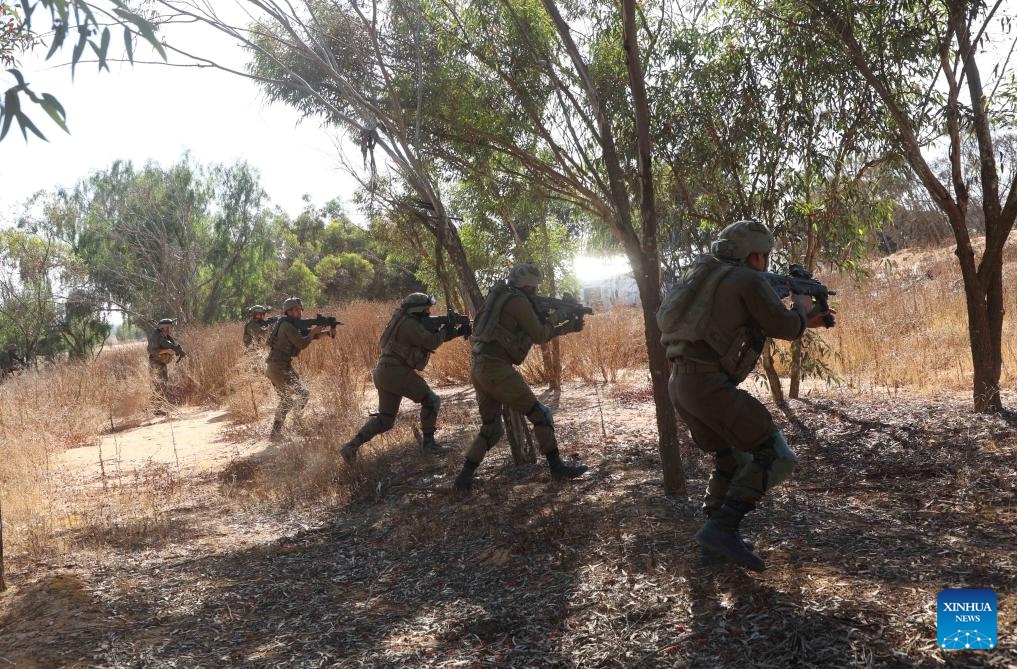Attack on Rafah pushes conflict to crucial stage; Israel to seek leverage in truce talks or war escalates: expert

Israeli tanks entered the southern Gaza city of Rafah on Tuesday, even as the country sent a delegation to Cairo to resume talks for a potential truce. Chinese observers view Israel's military operation in Rafah as a pivotal moment in the conflict. The operation could either serve as a strategic and final move by Israel to gain leverage in truce negotiations, or it could escalate the current situation and lead to a wider humanitarian crisis, they said.
At least 27 people, including six women and nine children, were killed in Rafah since Monday evening, CNN confirmed through hospital sources in the southern Gaza city.
Israel's military has seized control of the Gaza side of the Rafah crossing, an Israeli military official said Tuesday. International pressure is growing against Israel following the seizure after it refused to rule out a full-scale invasion in Rafah.
Israeli Prime Minister Benjamin Netanyahu said Israel's military operation in Rafah serves the twin goals of returning the hostages held in Gaza and eliminating Hamas. Benny Gantz, a member of Israel's war cabinet, said the Israeli military's operations in Rafah will "continue and expand as necessary," media reported.
The incursion got underway as both Hamas and Israel reportedly sent a delegation to negotiate in Cairo, Egypt, NPR quoted anonymous officials as saying. Copies of the three-stage deal that Hamas agreed to were leaked Monday night. The deal includes temporary pauses in fighting, Hamas freeing Israeli hostages over stages in exchange for Israel's release of Palestinian captives and detainees, more aid entering Gaza and Israeli troops withdrawing from parts of the territory, NPR reported.
However, Israel's War Cabinet said Monday the deal Hamas agreed to fell short of its "core demands," without elaborating.
"The negotiations are more of a diplomatic battle, and for Israel, invading Rafah has always been its goal," Liu Zhongmin, a professor at the Middle East Studies Institute of Shanghai International Studies University, told the Global Times. He believes it is possible that Israel's attack on Rafah is to seek an advantage at the negotiations.
Chinese experts noted that Israel's military operation in Rafah has pushed the conflict to a tipping point. From a military conflict perspective, the Rafah conflict may be the final battle, but on the other hand, Israel's attack on Rafah could escalate further, leading to a large-scale humanitarian disaster, Liu said.
The United Nations and aid agencies have slammed the Israeli army for cutting off an essential aid route by seizing the Palestinian side of the Rafah border crossing between Egypt and southern Gaza, warning that already scarce supplies will be further depleted in the enclave that is on the brink of famine, media reported on Tuesday.
US President Joe Biden's administration paused a shipment of weapons to Israel last week in opposition to Israel's incursion in Rafah, the Guardian quoted a senior administration official as saying.
Washington's decision to temporarily halt weapons shipments to Israel is seen as a symbolic gesture aimed at alleviating both domestic and international pressure over its support for Israel. Chinese experts believe that the US has the capability to impose more significant pressure to compel Israel to cease its assault in Gaza, but instead chose a relatively minor action. "It is akin to giving a reward of $100 and then taking back a small portion due to misbehavior. Ultimately, the reward still stands," said Zhu Yongbiao, executive director of the Research Center for the Belt and Road at Lanzhou University, in an interview with the Global Times.
He said the US move has raised suspicion whether it is still overwhelmingly biased toward Israel, and is possibly colluding with Israel to stage a show.
On Tuesday, China and France released a joint statement on the situation in the Middle East, in which the two heads of state expressed their opposition to an Israeli offensive on Rafah, which would lead to an even bigger humanitarian disaster, as well as the forced displacement of Palestinian civilians.
Zhu hailed the statement as marking another major effort by China in mediating the Middle East conflict, as it is an agreement reached by two permanent members of the United Nations Security Council, and paves way for China and France, as well as China and Europe, to seek collaboration in mediating the crisis in the Middle East.
Apart from sending envoys to the Middle East to promote negotiations and trying to reach a cease-fire deal at the UN level, China also invited Fatah and Hamas to hold talks in Beijing last month. In the future, China will continue facilitating reconciliation between forces within Palestine to form a unified government and voice when participating in talks with Israel, Liu said.
Zhu said that although the situation in Gaza is grim, it is likely that the Palestine-Israel conflict will turn to politics and diplomacy for solution after the Rafah attack, which will enable China to play a bigger role in mediating. Moreover, China can also contribute in areas such as the reconstruction of Gaza in the future.